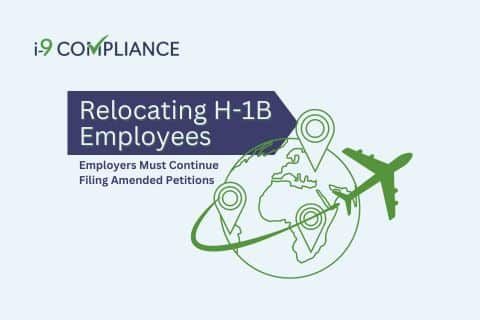Employers Must Continue Filing Amended Petitions for Relocating H-1B Employees

July 14, 2023
The United States Citizenship and Immigration Services (USCIS) may require employers to file amended H-1B visa petitions. However, this requirement will affect those who relocated some employees to new locations without following all the requirements. This call to action follows a ruling by the U.S. Circuit Court for the District of Columbia.
Employers typically use H-1B visas when hiring non-immigrant aliens in specialty occupations. They rely on these workers when they cannot find U.S. workers with the skills and abilities needed. However, the position must meet specific requirements to qualify as a specialty occupation. For example, they must require at least a bachelor’s degree or the equivalent and the application of specialized knowledge.
When hiring these workers, employers must adhere to specific terms, facts, and conditions of employment. The USCIS and U.S. Department of Labor (DOL) approved and certified these regulations. Sometimes, employers may need to change some of the conditions for H-1B employees, including where they work.
In 2015, an administrative ruling affirmed that the USCIS would consider changing an H-1B worker’s employment location a “material change.” As a result, employers must file an amended petition when they want to change these employees’ work location.
However, in late 2020, an industry group representing IT companies challenged this administrative rulemaking. The companies they represented often needed to change their worker’s employment locations. As such, the representatives claimed this ruling as “procedurally defective.” Earlier this year, the U.S. District Court for the District of Columbia ruled in favor of the USCIS. It found that the decision did not violate the public notice and comment requirements of the Administrative Procedure Act.
The recent ruling from the D.C. Circuit Court has confirmed the previous decision. It stated that the USCIS’s established interpretation acted as an informal adjudication to interpret an agency regulation. Furthermore, the “material change” regulation permits the agency to monitor material changes with specific stipulations. For example, it comes with the understanding of potential review and adjudication of terms and conditions of employment.
This ruling significantly impacts employers. For example, a single approved H-1B petition may prove insufficient for the approved period of employment. As such, employers may find it necessary to repeatedly amend petitions when changing an H-1B employee’s working location.
This ruling is not the only paperwork hassle for employers of foreign national workers. Another common pain point for these employers is the employment eligibility verification (Form I-9) process. Due to the ever-shifting regulations, this process has proven challenging for foreign national workers. The best way to ensure uniform compliance with every form is to employ an electronic I-9 management tool. It can guide personnel through the process and provide reminders when further action is required.
Our I-9 Compliance tool will help quickly verify your employment eligibility automatically.